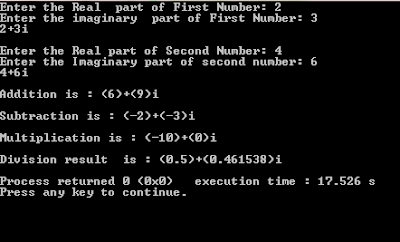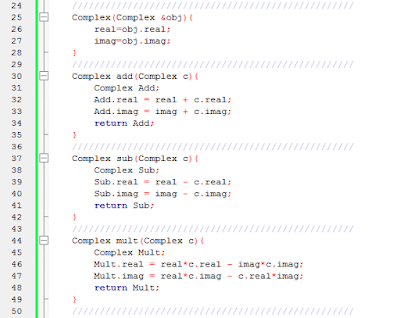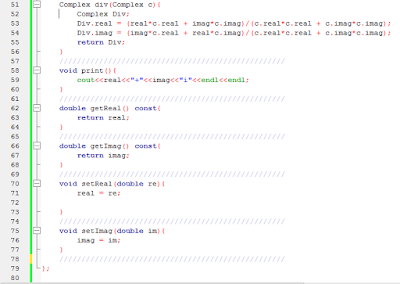C++ class for addition, subtraction, multiplication and division for complex numbers.
Class has four functions to perform arithmetic operations. It takes two complex numbers input from user real and imaginary parts separately.
The double data type is used to perform all operations. Code tested using c++ CodeBlocks IDE.
program input-output
Program images
also, find more examples here C++ Examples
#include <iostream> using namespace std; //**********COMPLEX CLASS************************ class Complex{ private: double real,imag; public: Complex(){ real=imag=0; } /////////////////////////////////////////////////// Complex(double r){ real=r; imag=0; } /////////////////////////////////////////////////// Complex(double r, double i){ real=r; imag=i; } /////////////////////////////////////////////////// Complex(Complex &obj){ real=obj.real; imag=obj.imag; } /////////////////////////////////////////////////// Complex add(Complex c){ Complex Add; Add.real = real + c.real; Add.imag = imag + c.imag; return Add; } /////////////////////////////////////////////////// Complex sub(Complex c){ Complex Sub; Sub.real = real - c.real; Sub.imag = imag - c.imag; return Sub; } /////////////////////////////////////////////////// Complex mult(Complex c){ Complex Mult; Mult.real = real*c.real - imag*c.imag; Mult.imag = real*c.imag - c.real*imag; return Mult; } /////////////////////////////////////////////////// Complex div(Complex c){ Complex Div; Div.real = (real*c.real + imag*c.imag)/(c.real*c.real + c.imag*c.imag); Div.imag = (imag*c.real + real*c.imag)/(c.real*c.real + c.imag*c.imag); return Div; } /////////////////////////////////////////////////// void print(){ cout<<real<<"+"<<imag<<"i"<<endl<<endl; } /////////////////////////////////////////////////// double getReal() const{ return real; } /////////////////////////////////////////////////// double getImag() const{ return imag; } /////////////////////////////////////////////////// void setReal(double re){ real = re; } /////////////////////////////////////////////////// void setImag(double im){ imag = im; } /////////////////////////////////////////////////// }; //***************MAIN*************************** int main() { double real1,imag1,real2,imag2; cout<<"Enter the Real part of First Number: "; cin>>real1; cout<<"Enter the imaginary part of First Number: "; cin>>imag1; Complex obj1(real1,imag1); obj1.print(); cout<<"Enter the Real part of Second Number: "; cin>>real2; cout<<"Enter the Imaginary part of second number: "; cin>>imag2; Complex obj2(real2,imag2); obj2.print(); Complex c; c = obj1.add(obj2); cout<<"Addition is : ("<<c.getReal()<<")+("<<c.getImag()<<")i"<<endl; c= obj1.sub(obj2); cout<<endl<<"Subtraction is : ("<<c.getReal()<<")+("<<c.getImag()<<")i"<<endl; c= obj1.mult(obj2); cout<<endl<<"Multiplication is : ("<<c.getReal()<<")+("<<c.getImag()<<")i"<<endl; c= obj1.div(obj2); cout<<endl<<"Division result is : ("<<c.getReal()<<")+("<<c.getImag()<<")i"<<endl; return 0; }
program input-output
 |
| program output |
Program images
also, find more examples here C++ Examples







